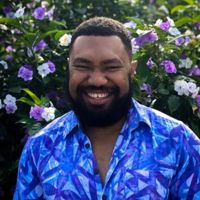FIJI’S rural and remote communities may be blessed with resources and natural beauty, but their proximity often makes it difficult to accord basic services.
Among them is healthcare, something which Dr Epeli Navela realised was amiss in his village.
As he grew older, his duty of care towards his elderly grandparents eventually pushed him towards the medical field.
Sadly, he ended up losing his maternal grandmother to a diabetic foot sepsis when he entered the Fiji School of Medicine (FSM).
Buoyed by the memories of his loved ones, he persisted through the challenging years of medical school to emerge as a doctor.
Eventually, he gravitated towards ophthalmology, and it is a field he remains in today.
The 33-year-old, who hails from Drekeniwai, Navatu in Cakaudrove, with maternal links to Moce, Lau, is the eldest of four children.
As a youngster, he saw firsthand the amount of people in his village who needed medical care, however, this was not readily available, and many did not know about or understand their illnesses.
Being raised by his ageing maternal grandparents, Dr Navela said at the time, they had diabetes and high blood pressure.
“I was really trying to get into a place where I could somewhat control and help them, but by the time I got to my first year of medical school, my grandmother had passed away from a diabetic foot sepsis,” he said.
“So that really drove me to finish and try to help whoever was still alive in my family and my relatives and generally Fiji as a whole.”
Following the completion of medical school, Dr Navela did his internship at CWM Hospital for one year before moving to rural and maritime areas.
“My first posting was on Vanuabalavu for just a few weeks after that, went to Vunisea in Kadavu, was there for a few months and then moved on to Wainobokasi.
“By that time, I already was looking into ophthalmology and looking at how such a profession or a speciality really did a lot of change for a lot of people because they would come for outreaches to Wainibokasi.
“Seeing how some of the patients will be coming to us, blind, totally dependent on relatives, and then another time the patient will come in and will be walking in without any assistance.
“It’s new, like they can see themselves and being independent. Seeing what such a small procedure can do for a lot of people, so I was really determined to make a difference and try to treat as much preventable blindness as possible.
“So straightaway I sent an email to Dr Luisa Cikamatana. She was the head of department for Lautoka Hospital. But at the time, she was sitting up at the ministry headquarters.
“From there, it was writing to the permanent secretary for that movement. I started my journey in ophthalmology in Lautoka. I was there for two years and from then, thanks to Fred Hollows Foundation in New Zealand, was able to be sponsored.
“I started my postgraduate study in 2019.”
Now, Dr Navela is under the tutelage of a learned senior doctor from Nepal who is an eye specialist, based at the Pacific Eye Institute in Suva.
“One of the main things that I’m happy about, with ophthalmology in general in Fiji, is the work that Fred Hollows Foundation New Zealand does here with the ministry.”
Outreaches carried out by the teams also allows medical professionals to offer their services to those living on the fringes of those who face accessibility issues.
His passion for the job, however, has not waned. And thanks to his experiences in places which face healthcare challenges, Dr Navela is committed to doing his part to encourage people to come forward and get their eyes checked.
He said a simple eye check would be enough to gauge whether one had a problem with their vision, a need to wear spectacles, or indicated an underlying health problem.
“The clinic is free. And we have walk in cases every day. You can come in, and someone will look at you.
“If it’s full and they tell you to come the next day, at least come. A lot of these diseases, if caught early, can be treated.”
He also encouraged medical students to consider branching out in ophthalmology.
“You get both the best of both worlds. You get to do medicine and you get to do surgery! It’s a great work-life balance.”


